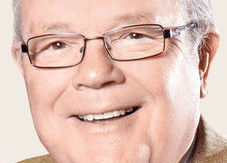By Peter Wagner
Many community newspapers are reporting that numerous business owners are saying “I don’t need to buy newspaper advertising. I promote my business for free on social media.”
If pressed, most will tell you they use Facebook to reach their needed buyers. But social media is really not social. Nor is it a form of media.
 I regularly work with a number of college fraternity chapters and attend their weekly meetings. I’m amazed at the members’ lack of attention. While one of the members stands and speaks to the group the others are all busy texting their girlfriends or one of their brothers sitting across the room.
I regularly work with a number of college fraternity chapters and attend their weekly meetings. I’m amazed at the members’ lack of attention. While one of the members stands and speaks to the group the others are all busy texting their girlfriends or one of their brothers sitting across the room.
Somehow, we’ve lost common respect for others, the ability to have verbal face-to-face conversations and the sense of community.
Truly social
I remember spending summers on the family farm in South Dakota. Every Saturday night the entire family would head into town to pick up groceries, machinery parts and whatever else might be desired.
But shopping was the least important part of the evening. My mother, Aunt Anne and female cousins would use the evening to visit with neighbors met in the stores to catch up on the latest rumors, revelations and romances. The men were doing the same thing in the hardware store and implement shop. No one went home until all the juicy details were totally shared. Now that was true social media.
My wife, who is in extensive rehab with a badly broken leg, sent me out shopping last Saturday. Finding the few simple items was easy. Checking out was hard. The huge discount store had only two of its 11 checkout lanes going.
Worst, both lanes had long lines of early-morning buyers wanting to check out overflowing carts of groceries, electronic gadgets, clothing, health and beauty products and more.
Waiting in line I found myself turning to the woman behind me to show off the oversized valentine I’d bought for our dog to give his mistress.
“I just have to show you this card,” I told the woman.
“I couldn’t resist it,” I said. It was large enough to fill the corner of my wife’s hospital room and it only cost $3. Best of all, the picture of the dog on the front was the spitting image of Duffer, our puppy.
It was the beginning of a beautiful 10-minute friendship. I learned she lived in a town not far to the north, taught grade school, had two children, a boy and a girl, was married to a grain farmer, went to the Methodist church and was in town for a postseason girls basketball tournament. Now that’s what I call getting social.
I believe there’s a place for Facebook in individual business marketing even though I’ve tried more than once to cancel my account. I find my day interrupted almost hourly by the same Facebook “friend” who seems sure I really care about what he had for lunch or dinner and the television shows he is planning to watch that night. One of Facebook’s biggest problems is not everyone wants to be lambasted with meaningless information sent by someone they hardly know. Many find it intrusive.
Serious reasons
But that problem aside, there are some serious reasons why no business should depend exclusively on Facebook especially and social media in general. Most also apply to Twitter and the many other internet information sharing platforms.
- Not all “friends” on a Facebook friends list receive the notice of a special sale or even a non-commercial message.
With over 2 billion users, Facebook users would be overwhelmed if every message copied to them was delivered. Therefore, only about 20 percent of those on a “friends” list actually get any message.
The users are determined by their interaction with the sender. Those who most often open, respond to or create messages to the business are the ones Facebook pre-selects to get the latest posting.
- The average local business has between 300 and 700 followers on their contact list.
When Facebook edits the list to their acceptable 20 percent level only 60 participants on the list of 300 get the message and just 140 of the larger list of 700.
- Facebook is not really free. It is possible to send sales and promotional postings to a larger group of followers, but Facebook charges handsomely for that privilege.
The result is the nation’s larger, better capitalized online retailers and discounters — who are willing and able to pay the fee — connect more often with your customers than you do.
- Creating and depending on a Facebook account creates an additional cost problem. “Friends” only look at Facebook postings when they find interesting, fresh material to read and share.
Keeping the site up-to-date requires the time and talent of a committed employee or an expensive outside content source.
- Facebook, Twitter and web server providers such as Google and Yahoo regularly sell the names, interests and e-mail addresses gleaned from their systems to interested buyers.
That means favored customers on your list can eventually appear on the e-mail and “friends” lists of national department and specialty stores, Amazon and all sorts of online discounters.
- Recent studies have revealed that many of those “wonderful” responses on Facebook or other internet sites have come from a single individual paid to make the service look good.
More recent national articles have stated increasing numbers of those comments have been created by robots, usually referred to as “bots,” with no human interest in the product or the service.
- A large number of Facebook or other digital service users live a great distance from the posting business.
Rather than buy long distance, they prefer to find a local business offering the same brands where they can touch, try on or otherwise experience the merchandise.
- Finally, Facebook and other digital services are consistently changing the rules.
There have been three major announcements regarding that problem this month alone. In one a retired top-level manager said, “Facebook is creating division” in our country. In another a different current top-level manager said he was “worried Facebook was destroying democracy.”
Most recently, Facebook announced it was reducing the importing of news on the system since users really only wanted happy talk. So much for the internet being media.
The newspaper still reaches the greatest number of local, dedicated buyers. In most cases those are buyers with both the money to make significant purchases and the interest in keeping the community strong and vital.
Message is clear
So, the message is clear. Social media has a place in local marketing and may grow more important in the years to come. But community newspapers will prevail and are necessary to guarantee creditability, create continuity and maintain local consensus.
Newspapers have survived the advent of radio, the coming of television, the appearance of cable television news channels and the arrival of internet messaging.
The reason is simple. Print is the only media that reaches the entire community. It exists to serve the people of the community and is the best way to share all credible news, original thoughts, creative ideas or unique opportunities and events with those enlightened readers.
 Nevada Press Association The best in Nevada journalism since 1924
Nevada Press Association The best in Nevada journalism since 1924
